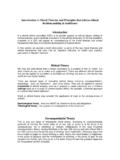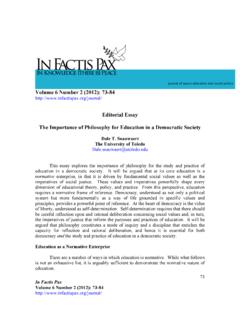Transcription of Swami Vivekananda’s Thoughts on Ethics
1 International Journal of Research on Social and Natural Sciences Vol. I Issue 1 June 2016 ISSN (Online) 2455-5916 Journal Homepage: Swami vivekananda s Thoughts on Ethics Tapan Kumar De, Philosophy, Vidyasagar University, India Article Record: Received April 9 2016, Revised paper received May 24 2016, Final Acceptance June 3 2016 Available Online June 7 2016 Abstract From the very beginning of the human society some ethical, social, and political codes are there to pave the way for the manifestation of humanity for the betterment of the society. Among all these codes, it is accepted that the codes of Ethics is the basis of all. Swami vivekananda thinks that Ethics is nothing but a code of conduct that helps a man to be a good citizen of the world.
2 The motto of Ethics , according to Swami vivekananda , is not self, but non-self. A man who wants to behave in accordance with the code of Ethics must put himself last, he must show his attention for the interest of others first. Swamiji says that all codes of Ethics are based upon this renunciation; destruction, not construction, of the individual on the material plane. The Ethics of Swami vivekananda leads us to a new concept of holism unlike the traditional concepts. In this small paper I want to jump into the ocean of holism to find out the real meaning and importance of the concept of Ethics of Swami vivekananda . Key words: Holistic Ethics , Inner qualities, Socialization, Dissociates, Anthropocentrism, Specisism, Sentientism, Self-abnegation, Spirituality, Phenomena, Noumena 1.
3 Introduction Generally the word Ethics refers to moral theory that involves systematizing defending and recommending concepts of right and wrong conduct. It also tries to resolve the disputes of moral diversity or moral conflict in practical life. It helps a human being to choose right path in moral conflict in particular situations. According to Cambridge Dictionary of philosophy The word Ethics is commonly used interchangeably with morality to mean .. and sometimes it is used more narrowly to mean the moral principles of a particular tradition, group, or individual (Robert, 1999). According to Rushworth (2003), Standard definition of Ethics has typically included such phrases as the science of the ideal human character or the science of moral duty.
4 This definition states Ethics as a science. To have an ideal character of human beings, being rational, have to follow Ethics systematically. Ethics is nothing but a system with some abstract forms of shape. To Lobaton, moral beings have some moral duties to perform. These duties should be performed in systematic way so that Ethics can be designated as a science. Richard Willam Paul and Linda Elder says, Ethics is a set of concepts and principles that guide us in determining what behavior helps or harms sentient creatures. ( ). In this definition the purpose of Ethics is clearly stated. It only aims to the sentient beings to be a member of moral community. In this sense it is too narrow to be accepted.
5 Today the concepts of Ethics incorporate both sentient and non-sentient beings in its arena. So, we have to think in a different way to present Ethics today. International Journal of Research on Social and Natural Sciences Vol. I Issue 1 June 2016 ISSN (Online) 2455-5916 We get a new concept of Ethics in the philosophy of Swami vivekananda . The Thoughts on Ethics of Swami vivekananda offer a new dimension to be a good human being on earth. It surely helps us to manifest our divinity that resides in our inner world to achieve the goal of humanity. 2. Types of Ethics Generally, it is accepted that there are three types of Ethics : Meta Ethics , Normative Ethics and Applied Ethics . Meta Ethics : Meta Ethics deals with the theoretical meaning and reference of moral proposition and how their truth values (if any) may be determined.
6 Normative Ethics : Normative Ethics deals with the practical means of determining a moral course of action. Applied Ethics : Applied Ethics draws upon ethical theories in order to ask what a person is obligated to do some very specific situation, or with some particular domain of action. Swamiji s Concept of Ethics : Ethics , according to vivekananda , is nothing but a code of conduct that helps a man to be a good citizen of the world. The world needs good citizens for the betterment of the people. Without good citizens, no system, social or practical can functions in right ways. All the systems are developed to offer better conditions for people who want to manifest their inner qualities to get the chance to realize their real nature.
7 According to Swamiji, The basis of all systems social or political rests upon the goodness of men. No nation is great or good because parliament enacts this or that, but because its men are great and good .. people often work for the same ends but fail to recognize the fact. One must admit that law, government, politics are phases not final in any way. There is a goal beyond them where law is not needed.. All great Masters teach the same thing Christ saw that the basis is not law, that morality and purity are the only strength. ( vivekananda S. 2009). From this excerpt, it is followed that Ethics or morality has something more than laws of a country that governs the people. We feel the necessity of laws, government, or politics for better governance, for the development of the society.
8 But all these facts have some limitations. They can act only as means, not as ends. End is something more, that lies beyond these facts. They can help us to reach the goal to some extent. Ethics is also a mean to reach the goal, but it lies beyond laws. The strength of morality is greater than those facts. Laws, politics can force a man to act accordingly. But they have no power to help a human being to manifest his/her perfection that resides in the core of their hearts. There is infinite power in our heart, but we are not aware of it. That is why we are exercising laws to keep the society intact. Laws are nothing but bondage. We have to overcome this bondage. So, we have to follow the codes of Ethics .
9 Ethics will help us finally to reach the goal. The Goal of Human Beings: What is the goal of human beings? There are different attitudes that explain in different ways the goal of human beings. The materialists will say that a prosperous life is our goal and we are trying to apply all out world forces to achieve it. We engage ourselves in doing science to open the door of our goal. What ourselves in doing science to open the door of our goal. What do we get from material prosperity? We collect some elements to make our lives more sophisticated and more powerful. Gradually, to collect all these elements we begin to hate others and trying to cheat others to collect more money, more power, more sophistication. In this way, we are manifesting our animality.
10 We degrade ourselves into the level of animals. The goal of human beings is to be a human being. A human being is nothing but a combination of both virtue and vices. Animality and humanity both are there in human beings. Manifestation of humanity dissociates a man from an animal. Animal is animal from the very beginning of its life. But a human being should be a man. The manifestation of animality is spontaneous. No education, no procedure is required for the manifestation of animality. But to manifest humanity a human being should have to go International Journal of Research on Social and Natural Sciences Vol. I Issue 1 June 2016 ISSN (Online) 2455-5916 through the process of education, through the process of socialization.







